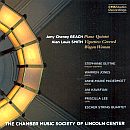
Faster than a buckin’ bronco, the venerable Chamber Music Society of Lincoln Center (CMS) and mezzo-soprano Stephanie Blythe are hitching a ride West with the Pony Express to present the Bay Area premiere of Alan Louis Smith’s all-American song cycle, Vignettes: Covered Wagon Woman (2006). Written for Blythe’s overpoweringly beautiful and expressive voice, which not too long ago lifted the roof off Davies Symphony Hall during a performance of the Verdi Requiem, the cycle sets excerpts from the remarkable Daily Journal of Margaret Ann Alsip Frink. Mrs. Frink wrote the diary in 1850, as she and her husband crossed the continent from Indiana to Sacramento in a covered wagon.
Smith’s accessible, heartfelt cycle is the centerpiece of an all-American program, sponsored by San Francisco Performances at Herbst Theatre on April 23 at 8 p.m., which also includes John Antes’ Trio in D Minor for two violins and cello (1780), George Gershwin’s infrequently encountered Lullaby for string quartet (1919), and Amy Cheney Beach’s gorgeous, must-be-heard Quintet in F-sharp Minor for piano and strings (1907). Both Vignettes: Covered Wagon Woman and the quintet by Mrs. H.H.A. Beach — I’m using historically correct titles here — have recently been released on a marvelous CD from CMS Studio Recordings.
A phone chat with two veteran CMS members who will perform here, pianist Anne-Marie McDermott and violinist Ani Kavafian, uncovered the shocking news that this is the first all-American program that CMS has performed in the 30 years since Kavafian joined the ensemble.
Listen to the Music
McDermott, whose recent all-Gershwin recording for Bridge Records has received numerous critical accolades, affirms that Blythe is “very, very, very deeply into this piece. She feels it so much. It is quite an amazing performance, I have to say. She doesn’t need to do many gestures because the voice absolutely blows you away, and the music tugs at the heart strings.”
The Beach will prove an equal revelation to those lucky enough to attend. I had expected it be overly sentimental and quaint, but instead find it infinitely tender and involving. I concur with McDermott’s assessment that it’s a “hugely emotional, luscious, sensual piece that allows [performers] to go over the top in feeling and expression. It definitely should be programmed more.”
Throw in two rarities, the Antes piece (“quite baroque sounding and very, very lovely,” says Kafavian) and the Gershwin (“such a gentle loving piece, and a much more intimate side of Gershwin than you usually hear,” says McDermott), and you have an evening that beckons like the all-American yellow brick road.

